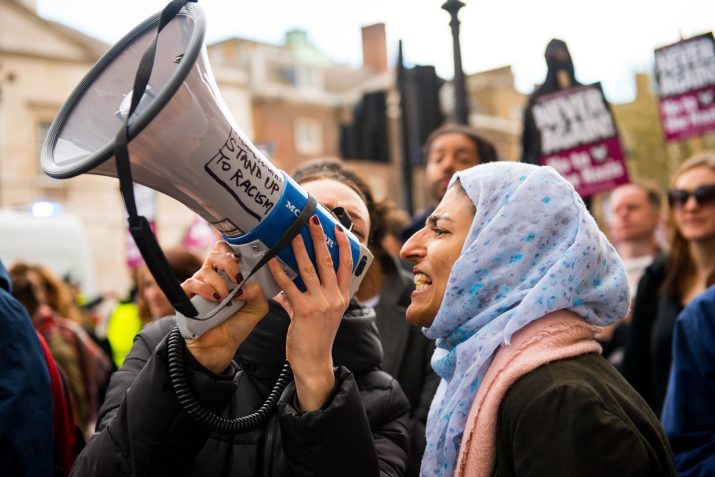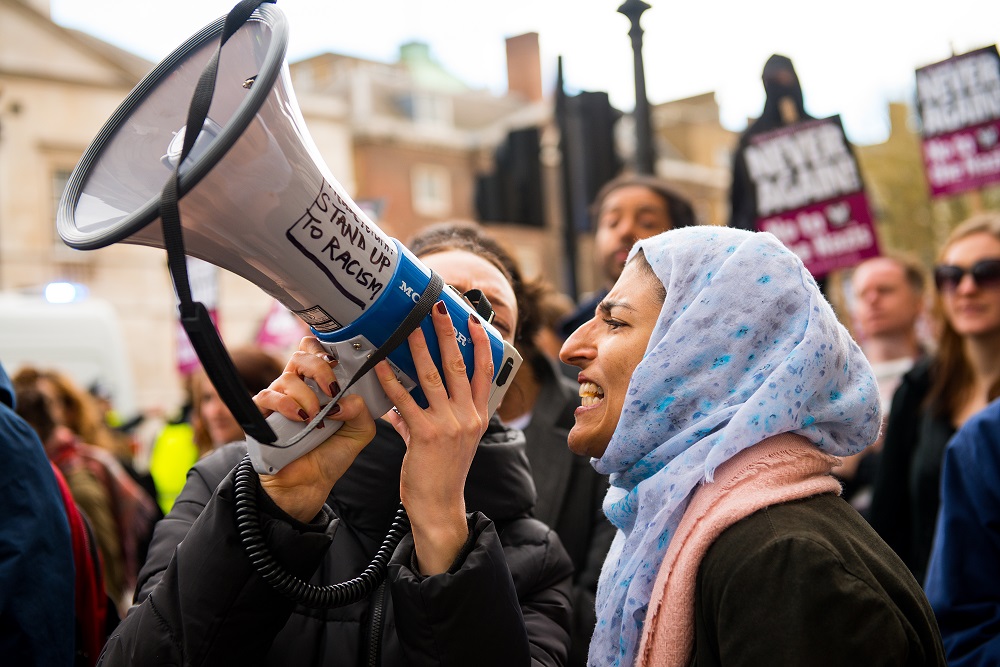

This is part of our special feature on Radicalism and Violence.
On March 14, 2018, Facebook banned Britain First from its platform, reasoning that they had “repeatedly posted content designed to incite animosity and hatred against minority groups.” This comes just a week after Britain First leaders Paul Golding and Deputy Leader Jayda Fransen were collectively convicted of four counts of hate crime and jailed for a combined period of 54 weeks. Their convictions related to the posting of videos on to their Facebook pages where they filmed themselves abusing innocent members of the public during a gang-rape trial for what the trial judge described as “their own political ends.”
The removal of Britain First from Facebook has sparked debate about the content of the group’s Facebook page and its posts, with high-profile figures such as the Mayor of London, Sadiq Khan, describing the group as “a vile and hate-fueled group whose sole purpose is to sow division.” By this time last year, Britain First had succeeded in receiving over 1.9 million likes and attracting 1.6 million followers on Facebook, thus making it by far Britain’s most popular political party on the platform. Since then, these numbers increased still further, with over 2 million likes and 1.8 million followers. According to the watchdog group Hope Not Hate, until its removal, Britain First had the “second most liked Facebook page in the politics and society category in the UK – after the royal family.” However, a number of important questions remain. How do groups like Britain First use social media, and how does this result in such unprecedented popularity? Does social media bring out xenophobia in British society? Is Britain First really that popular? Is this thanks to its online strategy; and if so, what is their secret?
Drawing upon data from an academic comparative study (Lorenzo-Dus and Nouri, forthcoming), two key tactics can be identified that shed some light on the popularity of Britain First. The first is the way in which the group engages with trending news stories and topical issues. In early 2017, for instance, Britain First posted comments about a grooming case that involved acts in the towns of Rochdale, Rotherham, and Telford. Britain First posted that there would be “marches in Telford against Muslim grooming gangs!” The case, as reported by the British media, described individuals identifying themselves as Muslim as allegedly involved in “child-rape grooming gangs” and raping British children. Britain First and their purported followers posted messages urging the government to “send them [Muslims] home to the middle east,” or remarking: “who wants to see half naked Muslim Men – particularly after the grooming and rape scandals?” In conversations like these, Britain First takes a popular news story and exploits it to fit their ideological perspectives. In these examples, Muslims are constructed as an existential threat to society. The Islamic community in the UK is equated with pedophiles, arguably the worst deviants in society, and as such serves to vilify more than 3 million people for preying upon young white British girls. In this way, the indigenous whites of Britain are constructed as victims of Muslim men who are depicted as sexual predators.
At the same time, British First criticized political and law enforcement authorities for their alleged inaction, suggesting that the underlying reason was their unwillingness to hold the perpetrators accountable. For example, one post remarked that it is “not a surprise it took many years for Politicians local Authorities Police to face the very wide spread child grooming Muslim gangs so this type of Jihad is also tucked under the carpet!” Still another commented: “the people who allowed the Rotherham child rape grooming gangs to flourish will never face justice.” The implication was that these authorities had not acted effectively for fear of the negative reactions – such as allegations of racism – this may have caused. This criticism is strategically effective as it allows Britain First to suggest that they would be better placed to police the nation. It also shows how Britain First is able to use social media to denigrate Muslims, propagate its political ideology, and position itself as an alternative to the status quo.
A second tactic employed by Britain First is to utilize in-group and out-group positioning. This can be seen in the previous example: for those who believe their posts about Muslims and grooming there is no choice about whose side to be on: Britain First. Readers are challenged to consider who they wish to identify with. One post revealingly stated: “Everything wrong in the world the people is Islam … Arrests and deportations need to start.” Another Facebook poster asked: “why no arrests oh we know why They can do as they like in London the police are on their side and so is the Mayor after all he is one of them and running the joint!” (notice the repeated use of “we” and “they”/” their”). In examples like these, Britain First calls for a more effective state response, urging more arrests and deportations of Muslims in the UK. Further, a conspiracy between political authority – in this case the Mayor of London, Sadiq Khan (of Muslim faith) – is suggested. This has two functions: first, it puts Britain First at the forefront of the call for more legitimate political and criminal justice policies; and, second, it attempts to expose existing legal and political systems as hopelessly corrupt.
These are just two of the tactics employed by Britain First. Their success is particularly noteworthy when compared to the relative lack of online visibility by the group’s radical right rivals. Britain First has been able to take center stage on one of the most popular social media platforms for a number of years. Rather than thinking that the problem has gone away simply because Britain First has been removed from Facebook, more work is needed to understand its popularity before another, similar, group emerges in its place. Here specialist researchers and social media companies have a responsibility to work together to advance understanding, so that credible alternatives can be developed and disseminated.
Lella Nouri is a Senior Fellow with CARR, and Senior Lecturer of Criminology at Swansea University.
[1] This essay is based on work in which the author collaborates with Professor Nuria Lorenzo-Dus based in the Department of Linguistics at Swansea University.
Photo: London, UK. English Defence League / Britain First rally with counter demo by the Unite Against Fascism movement in central London | Shutterstock
Published on October 2, 2018.




